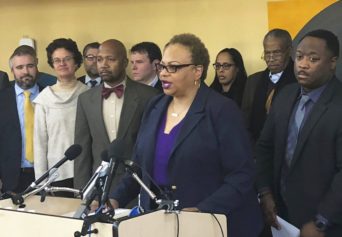In a case that illustrates a basic problem in how many police perceive their jobs, a Seattle police official told his officers that they aren’t using enough force in interactions with the public and, bizarrely, more use of force would serve to protect not only fellow officers but “the public and the suspect from harm.”
“Some officers are very hesitant to use force in situations where force is clearly needed,” East Precinct Lt. Bryan Grenon wrote in an internal email, obtained by local television station KIRO 7 in Seattle. “Please communicate to our officers to use force when necessary to protect themselves, fellow officers, the public and the suspect from harm.”
The internal memo comes amidst a sense of outrage in African-Americans communities across the country over the excessive use of force. Numerous incidents, many caught on videotape, show police abusing and even killing people of color without sufficient reason or provocation.
Interestingly, the Seattle complaint inside the force comes in response to the implementation of a new “use of force” policy mandated two years ago by the U.S. Justice Department (DOJ) Civil Rights Division after the division found a pattern of excessive force in the department.
Part of the new policy requires officers to file extensive paperwork following physical interactions with suspected criminals. In order to avoid the paperwork, observers suspect, officers are likely avoiding the use of force.
In other words, the new policy is working.
Perhaps the Seattle case provides an example for other departments where officers are too quick to use excessive force. The fear of paperwork serves as a controlling device. Paperwork might serve to save the lives of African Americans.
The Department of Justice began investigating Seattle after a string of explosive police brutality cases. One of the most disturbing was the shooting death of a partially deaf Native American woodcarver, John T. Williams, 50, who was killed in August 2010 after officers came upon him holding his carving knife and a block of wood. After officers told him to drop the knife and he didn’t comply, officer Ian Birk shot and killed Williams. The partially deaf Williams likely didn’t even hear the command.
During its investigation, the Justice Department found at least one in five uses of force by SPD officers was unconstitutional, according to the Seattle Post-Intelligencer. Officers were too quick to use weapons, including clubs and flashlights, and their use was not justified or was excessive in over half of the cases, the newspaper quoted from a Justice report. There were dozens of other cases that could have been unconstitutional, but DOJ investigators couldn’t find sufficient information on the incidents — a problem that the new use of force policy seeks to remedy by requiring full reports on physical encounters.
In May, more than 100 Seattle police officers filed a federal lawsuit claiming the new policy violated their rights to defend themselves.
One of the officers in that suit is Mike Severance, who just retired from the force after 46 years.
“I think an officer will eventually get killed,” he told NPR, saying the new policy is “ridiculous.”
Seattle officers are now supposed to make additional calculations before deciding how to act and Severance says that added time can endanger their lives—such as when the policy tells the officer to take into consideration whether a suspect speaks English, or is mentally ill.
“What do we consider? Yeah, this guy’s nuts, and he’s holding a gun — so that means he’s not a threat or he’s less of a threat? He’s probably more of a threat,” Severance says.
Lisa Battalia, a lawyer who helped officers write their lawsuit, says the policy is also wrong to make it a priority for officers to de-escalate a situation.
“What these officers would say is, ‘Actually, that’s not always better,’ ” Battalia says. “In many cases, that allows a situation to get out of control. It allows a suspect to get an upper hand, and it winds up being more dangerous for everybody.”
Such talk is horrifying to many African Americans, who know what it often means for them when officers are told they should act quickly based on their gut. Numerous studies have shown that police—and most everybody else in society, including other African Americans—are quicker to believe an African American is a potential threat than members of other groups.
Seattle Police Chief Kathleen O’Toole told KIRO 7 she hasn’t seen evidence of any cases where an officer hesitated in using force.

